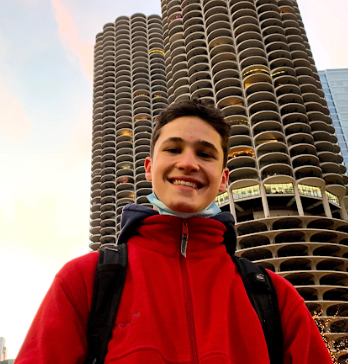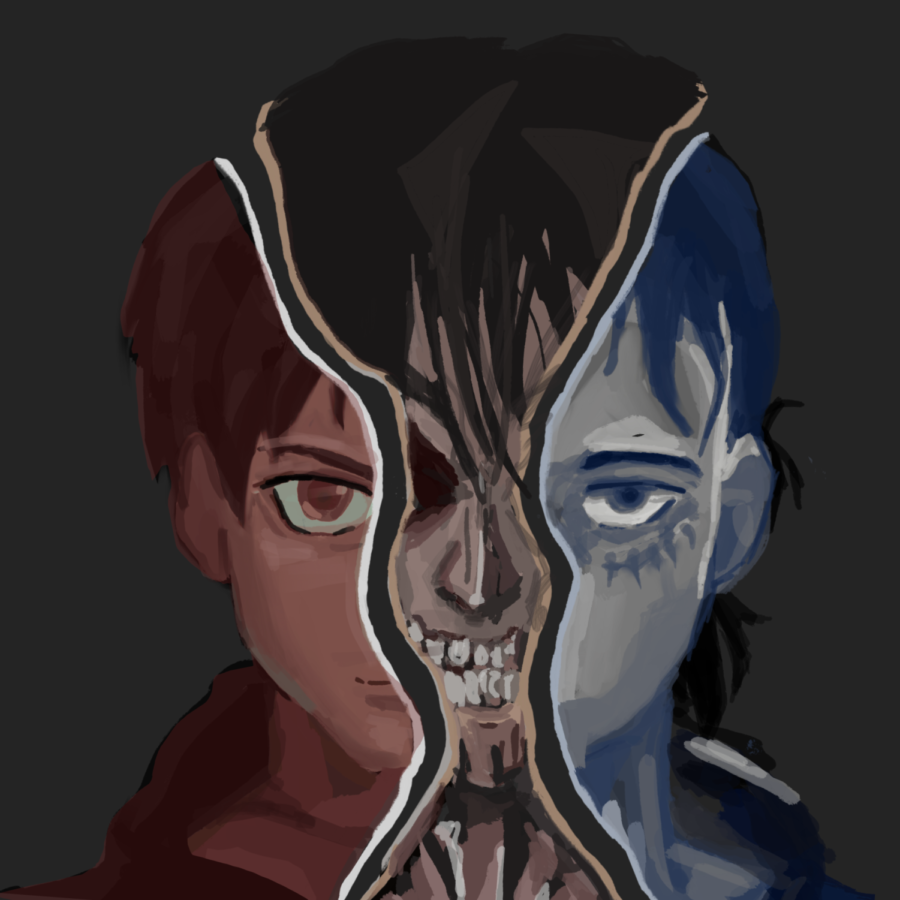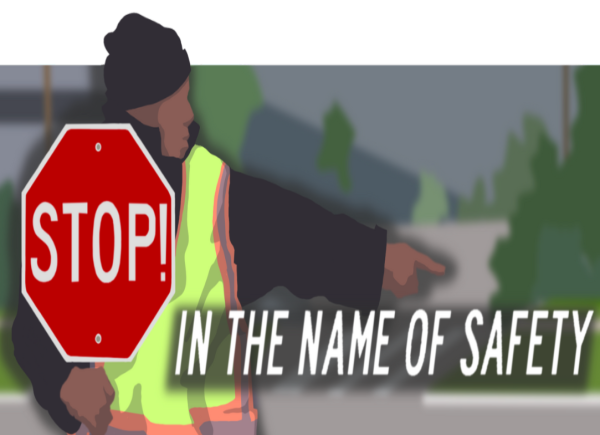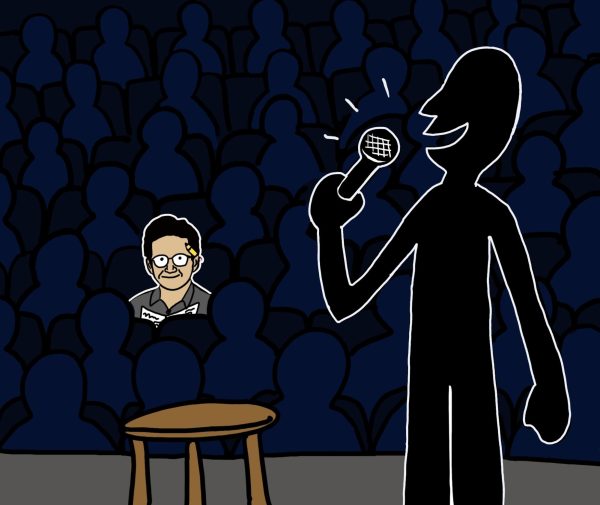Season four of ‘Attack on Titan’ experiences spike in viewership, improved plot
AOT is rated for mature audiences and discusses mature content. This review contains spoilers .
The rave anime Attack On Titan (AOT) is finally back, and viewers have a lot to say. After close to a full year, the highly anticipated second part of the fourth and final season began airing on Jan. 9. Divided into two parts, the first was very slow. Filled with long scenes of politics, it had a focus on building to this second part. Nonetheless, it has been extremely rewarding, as these nine episodes have been a whirlwind of action.
Originally released as a manga series in 2009—and finishing its releases just last year— AOT’s popularity propelled it to the big screen. The first episode premiered in 2013, following main character Eren Jaeger. In the show, Eren lives in a city plagued by human-eating titans, and begins to uncover a bigger conspiracy about their origins. Throughout the series, the story twists and turns with many betrayals, leading eventually to conflict with other humans. As the show nears its conclusion, and the story builds to the climax, Eren enacts his plan to take over the world and save his home.
The entire fourth season has received great reviews online, garnering an episode average of 9.1 stars on iMDB, and a series rating of 96 percent on Rotten Tomatoes. In 2021, it was the most in-demand TV show in the world, and many students here at ETHS are a part of that number.
The first thing in the recent episodes that everyone seems to notice is pretty unsurprising: the new opening song. It features elements of heavy metal and hard rock. The song is a long way away from the opening in part one, which featured an extremely suspenseful and more dramatized opening, and has gotten mixed reviews across the board.
“It’s good but it’s overrated,” says junior Josh Thomas.
It’s easy to see how this opening fell short of the others, especially because it holds so much importance as the finale approaches. Such a monumental season can’t be bogged down by a sub-par theme song, and some people seem to think that’s the issue at hand.
“It’s just not that great. I don’t like the metal sound,…in Death Note i didn’t like it either,” junior Toby Rubenstein says.
He references another extremely popular anime, Death Note, which featured a similar song in it’s introduction. The metal sound was unexpected, but the introductions have always varied. Between the invigorating ‘Guren no Yumiya’ in the first half of season one, or the melancholic ‘Red Swan’ in the first half of season three, each new song is refreshing. Despite these discontented reviews, lots of students do enjoy it.
“I really like it [because] It has some metal aspects. The screaming, I really like that,” says senior Jai Fischer.
He is not alone in this, and whether people loved it or not, the song actually hit No.3 on the Billboard Rock charts when it first debuted in January. This surprising new introduction ushered in the second part perfectly, only adding to the tremendous buzz around it. As it picked up from part one, we returned to another hot topic, which has only become more contested this season
In spite of these differences, one opinion was the common denominator between all the interviews I did:
“It’s a complete masterpiece from season one [through] season four,” says junior Gabari Monroe.
This appreciation for the show was echoed across every conversation I had. No matter where they stood in debates over characters, everyone loved it.
“It’s a ten out of ten. I would recommend it,” agrees junior Nemi Cooper.
I tried to avoid numerical ratings like this, but many people gave them regardless, and almost all were nine or ten out of ten. Many students raised the point that the plot was very-well done. AOT stands out, especially today, as so many shows across all genres are overflowing with incessant drama and filler.
“[It’s a] great show, lots of thought and detail went into it,” says freshman Rachael Rubin. “[There are] many hidden gems and plot twists.”
The plot twists are a very important part of AOT as they make it very hard to guess what will happen next. Every character has a role, no matter how small, and every piece of the story works together to form a thrilling one.
“Every second of the show is important, every episode is packed with so much detail, and that’s what makes it so well sold,” sophomore Henry Chapon points out.
He notes the popularity of the series, which is hard to ignore. Both the manga and the anime are in the top ten best selling/most viewed of all time, which is an impressive feat considering it’s recency.
The plot is a large indicator of the quality. Where other anime like Demon Slayer mastered the quality of their art, it’s AOT’s story that is regarded as perfect.
Continued on evastonian.net
For Online:
The introduction of new characters in all of season four saw the rise in notoriety of one specific character named Gabi Braun. She is definitely one of the most complex in the show: a child soldier, brainwashed past the point of compassion. Fans everywhere despise her for killing the beloved character Sasha, but these new episodes have shown growth in her, and some are changing their minds.
“I really hated her at first…but I grew to kind of like her, because she’s not being as stupid anymore” says senior Alex Lobban.
As the season progressed, we began to see her become more remorseful, and more understanding that she is a product of brainwashing and manipulation. The complexity of her situation didn’t go over fans’ heads though.
“We’re taught to be biased towards Eren because we’ve seen him the whole show, but Gabi is literally the flip side of that, which makes you hate her, but in reality, you technically are hating Eren in a way,” junior Gabari Monroe noticed.
This unique parallel is one of many in the show but is interesting as it provides a look at how similar both sides are. Both Eren and Gabi’s homes were attacked by outsiders, and people they loved were killed. This subtle look into the dichotomy between both, as well as the biases we hold as viewers, is a very gorgeous way to establish both sides of the issue.
Part two has also brought another important discourse between fans, as they have been ferociously debating the morality of Eren’s plan of world domination. This plot is weighed against his half-brother Zeke’s plan to use a power to euthanize all members of his race, saving future generations from suffering.
“It’s really complicated with both of their backgrounds—Zeke’s father basically brainwashed him,” says Lobban.
He references Zeke’s upbringing in a segregated area, and his youth as a second-class citizen because of his heritage. His father tried to indoctrinate him to be a revolutionary with him, but it backfired and their family fell apart. The debate—although only explored from a limited perspective—touches on eugenics, genocide, and a deeply dividing “us-or-them” survival mentality. Many fans have sided with Eren for other reasons though.
“[The producers] kind of want you to side with Eren for part of it, because he’s the protagonist, and we’ve been watching it from his perspective the entire show” explains Rubenstein, adding that, “We are biased towards them. … We don’t want them to die”.
Most viewers feel this way, sharing sentiment towards Eren rather than Zeke. That familiarity makes it hard for us to dislike him, and has led to many agreeing with him. Nevertheless, not everyone does.
“Eren’s gone a different path than I would have expected. He’s more like the villain” sophomore Lucas Macy argues.
This anti-hero trope is another very complex situation the show brings up, keeping the viewers constantly unsure of who they side with. It places us against our instinct to root for the main character that we know so well, and creates such a vast difference between the two sides.
Your donation will support the student journalists of the Evanstonian. We are planning a big trip to the Journalism Educators Association conference in Philadelphia in November 2023, and any support will go towards making that trip a reality. Contributions will appear as a charge from SNOSite. Donations are NOT tax-deductible.

















